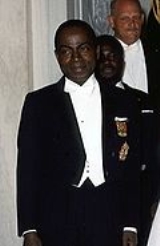
African Agricultural Union
Encyclopedia
The African Agricultural Union was the first quasi-political party in Côte d'Ivoire
, led by Félix Houphouët-Boigny
throughout its existence. It was established on 3 September 1944 by Houphouët-Boigny and the colonial administration.
 The SAA was established on 3 September 1944 by Houphouët-Boigny and the colonial administration at an inaugural meeting in Abidjan
The SAA was established on 3 September 1944 by Houphouët-Boigny and the colonial administration at an inaugural meeting in Abidjan
. Under his presidency, it brought together African farmers who were dissatisfied with their paychecks and worked to protect their interests against those of European settlers. Anti-colonialist
and anti-racist
, the organisation demanded better working conditions, higher wages, and the abolition of unfree labour
. The union quickly received the support of nearly 20,000 plantation workers. Its success irritated the colonists to the extent that they took legal action against Houphouët. However, the SAA increased his popularity as the voice of the Africans.
When elected to the assemblée constituante on 4 November 1945, Houphouët-Boigny worked to implement the wishes of the SAA. He proposed a bill to abolish forced labour, the single most unpopular feature of French rule, on 1 March 1946 which the Assembly adopted in 1947. On 9 April 1946, Houphouët-Boigny, with the help of the Groupes d'études communistes d'Abidjan
, recreated the SAA as the Democratic Party of Côte d'Ivoire (PDCI), the first effective party in Côte d'Ivoire and the Ivorian section of the African Democratic Rally
.
Côte d'Ivoire
The Republic of Côte d'Ivoire or Ivory Coast is a country in West Africa. It has an area of , and borders the countries Liberia, Guinea, Mali, Burkina Faso and Ghana; its southern boundary is along the Gulf of Guinea. The country's population was 15,366,672 in 1998 and was estimated to be...
, led by Félix Houphouët-Boigny
Félix Houphouët-Boigny
Félix Houphouët-Boigny , affectionately called Papa Houphouët or Le Vieux, was the first President of Côte d'Ivoire. Originally a village chief, he worked as a doctor, an administrator of a plantation, and a union leader, before being elected to the French Parliament and serving in a number of...
throughout its existence. It was established on 3 September 1944 by Houphouët-Boigny and the colonial administration.
History

Abidjan
Abidjan is the economic and former official capital of Côte d'Ivoire, while the current capital is Yamoussoukro. it was the largest city in the nation and the third-largest French-speaking city in the world, after Paris, and Kinshasa but before Montreal...
. Under his presidency, it brought together African farmers who were dissatisfied with their paychecks and worked to protect their interests against those of European settlers. Anti-colonialist
Anti-imperialism
Anti-imperialism, strictly speaking, is a term that may be applied to a movement opposed to any form of colonialism or imperialism. Anti-imperialism includes opposition to wars of conquest, particularly of non-contiguous territory or people with a different language or culture; it also includes...
and anti-racist
Anti-racism
Anti-racism includes beliefs, actions, movements, and policies adopted or developed to oppose racism. In general, anti-racism is intended to promote an egalitarian society in which people do not face discrimination on the basis of their race, however defined...
, the organisation demanded better working conditions, higher wages, and the abolition of unfree labour
Unfree labour
Unfree labour includes all forms of slavery as well as all other related institutions .-Payment for unfree labour:If payment occurs, it may be in one or more of the following forms:...
. The union quickly received the support of nearly 20,000 plantation workers. Its success irritated the colonists to the extent that they took legal action against Houphouët. However, the SAA increased his popularity as the voice of the Africans.
When elected to the assemblée constituante on 4 November 1945, Houphouët-Boigny worked to implement the wishes of the SAA. He proposed a bill to abolish forced labour, the single most unpopular feature of French rule, on 1 March 1946 which the Assembly adopted in 1947. On 9 April 1946, Houphouët-Boigny, with the help of the Groupes d'études communistes d'Abidjan
Communist Study Groups
Communist Study Groups , was a communist group in colonial French West Africa/French Equatorial Africa. GEC was founded in 1943, under the influence of the French Communist Party. GEC formed branches in the capital cities of the West African territories. GEC was primarily based amongst intellectuals...
, recreated the SAA as the Democratic Party of Côte d'Ivoire (PDCI), the first effective party in Côte d'Ivoire and the Ivorian section of the African Democratic Rally
African Democratic Rally
The African Democratic Rally was a political party in French West Africa, led by Félix Houphouët-Boigny. Founded in Bamako in 1946, the RDA quickly became one of the most important forces for independence in the region. Initially a Pan-Africanist movement, the RDA ceased to function as a...
.

